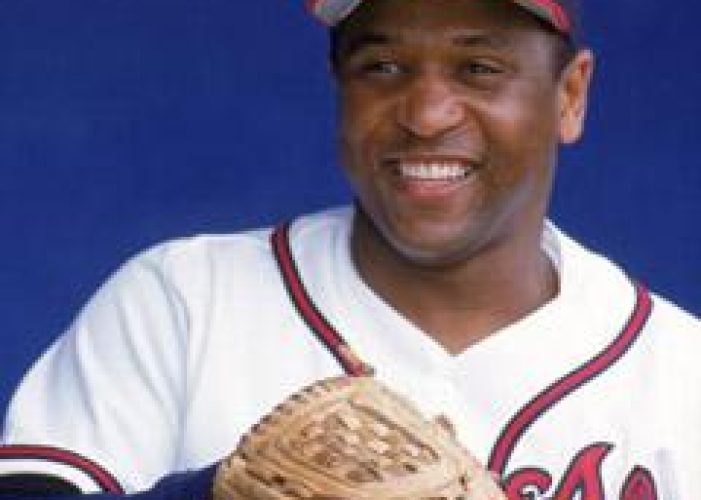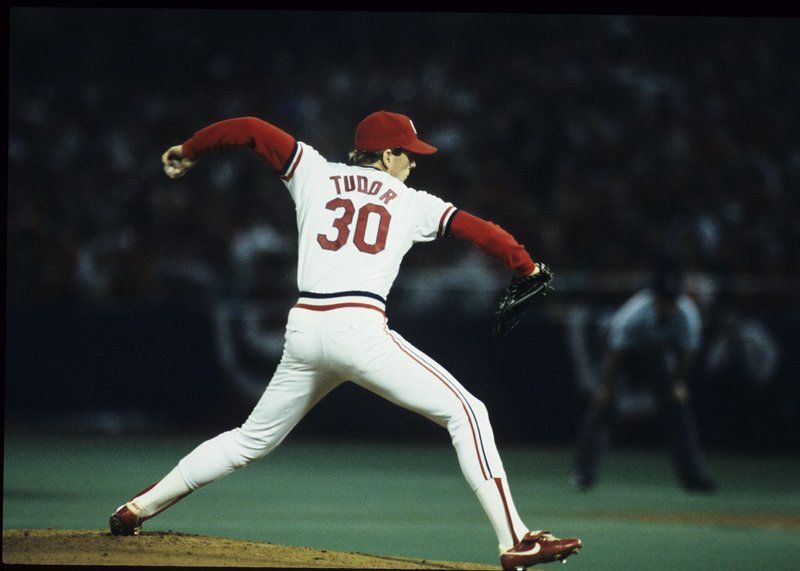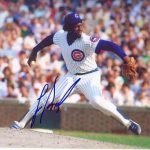test
Terry Pendleton
Position: Third Baseman
Bats: Both • Throws: Right
5-9, 178lb (175cm, 80kg)
Born: July 16, 1960 in Los Angeles, CA
Draft: Drafted by the St. Louis Cardinals in the 7th round of the 1982 MLB June Amateur Draft from California State University, Fresno (Fresno, CA).
High School: Channel Islands HS (Oxnard, CA)
Schools: Oxnard College (Oxnard, CA), California State University, Fresno (Fresno, CA)
Debut: July 18, 1984
Last Game: September 25, 1998
Full Name: Terry Lee Pendleton
Notable Events and Chronology for Terry Pendelton Career
Biography
After several solid seasons with the St. Louis Cardinals during the 1980s, Terry Pendleton emerged as a star with the Atlanta Braves in the early 1990s, leading the Braves to back-to-back World Series appearances in 1991 and 1992. The slick-fielding third baseman captured N.L. MVP honors in his first year with his new team, topping the senior circuit with a .319 batting average, while also providing veteran leadership to a relatively inexperienced group of young but talented players. He followed that up by finishing runner-up in the league MVP voting in his second year with the Braves, leading them to another N.L. championship. A positive influence wherever he went, Pendleton played for five pennant-winners and six division champions during his career, which began in St. Louis in 1984 and ended 14 years later back in the state of Missouri with the Kansas City Royals.
Biography:
Born in Los Angeles, California on July 16, 1960, Terry Lee Pendleton began his baseball career as an Eastside Little League player, before moving on to play for his Channel Islands High School team in Oxnard, California. After graduating from Channel Islands, he attended Fresno State University, where he earned All-American honors as a second baseman. Selected by the St. Louis Cardinals in the seventh round of the 1982 amateur draft, Pendleton spent the next two years in the St. Louis farm system, during which time he gradually shifted to third base. The young infielder developed so rapidly at his new position that the Cardinals traded their starting third baseman Ken Oberkfell to the Atlanta Braves and temporarily moved outfielder Andy Van Slyke to third to allow Pendleton to gain a bit more experience at the hot corner. However, when Van Slyke committed seven errors in 30 games, St. Louis promoted Pendleton to the major leagues, immediately making him the team’s starting third baseman.
Pendleton made his debut with the Cardinals on July 18, 1984, getting three hits in five times at-bat during an 8-4 victory over the San Francisco Giants. He stayed hot the remainder of the year, batting .324 in 67 games for St. Louis, while also driving in 33 runs, stealing 20 bases, and hitting his first major league home run. Pendleton struggled somewhat at the plate during his sophomore season, batting only .240, although he managed to knock in 69 runs and steal 17 bases. Nevertheless, the 25-year-old switch-hitter’s outstanding glove work at the hot corner proved to be invaluable to the pennant-winning Cardinals, who benefited greatly from the fact that Pendleton placed second among N.L. third sackers in both putouts and assists.
Pendleton’s offensive struggles continued in 1986, when he batted just .239, hit only one home run, and knocked in just 59 runs, hitting mostly out of the sixth spot in the Cardinals batting order. Disappointed in Pendleton’s performance at the plate, the members of the St. Louis front office subsequently considered trading him away during the off-season. They reconsidered, though, when manager Whitey Herzog emphasized to them that Pendleton’s great range, quick reflexes, and powerful arm at third made him vital to the success of the team (he led all league third basemen in putouts and assists). Pendleton’s savvy base-running also helped him to contribute to the Cardinals’ offensive attack (he stole 24 bases in 30 attempts).
Pendleton answered his critics in the St. Louis front office by having his finest offensive season to-date in 1987. He finished second on the team with 12 home runs, batted .286, raised his on-base percentage from .279 to .360, scored 82 runs, drove in 96 runs, and stole 19 bases. Pendleton also led all N.L. third basemen in assists for the second straight year, earning in the process his first Gold Glove. Hampered by a rib injury during the postseason, he made only nine plate appearances against the Minnesota Twins in the World Series, after the Cardinals defeated the Giants in six games in the NLCS. Pendleton collected three hits in his seven official at-bats in the losing effort, for a .429 batting average.
Pendleton’s offensive production fell off considerably the next three years, although he put up decent numbers in 1989, when he hit 13 homers, knocked in 74 runs, scored 83 others, and batted .264. He also won his second Gold Glove that year, after leading all N.L. third basemen in assists for the third time, while also topping all players at his position in fielding percentage. Pendleton spent a considerable amount of time on the disabled list in both 1988 and 1990, limiting him to a total of only 231 games over the course of those two seasons. His various physical ailments also adversely affected his performance whenever he appeared in the St. Louis lineup, enabling him to compile a total of only 12 home runs and 111 runs batted in those two years, while batting just .253 and .230, respectively. Relegated to sharing playing time with Todd Zeile and Denny Walling by 1990, Pendleton chose to sign with the Atlanta Braves when he became a free agent at season’s end.
Pendleton blossomed into a star in the city of Atlanta, serving as the Braves’ offensive catalyst while leading them to the National League pennant just one year after they finished last in their division. In addition to leading the league with a .319 batting average, he topped the circuit with 187 hits and 303 total bases. He also drove in 86 runs and established new career highs with 22 home runs, 94 runs scored, eight triples, 34 doubles, a .363 on-base percentage, and a .517 slugging percentage. Although Pendleton’s outstanding performance failed to earn him his first All-Star selection, it enabled him to edge out Barry Bonds for first place in the league MVP voting. The Braves eventually lost the World Series to the Minnesota Twins in seven games, but Pendleton batted .367 in the Fall Classic, with 11 hits, two homers, and three RBIs.
Pendleton followed up his MVP season with another exceptional campaign in 1992. Leading the Braves to their second straight National League pennant, Pendleton batted .311, hit 21 homers, and established career highs with 105 runs batted in, 98 runs scored, 39 doubles, and a league-leading 199 hits. He also played extremely well in the field, topping all N.L. third basemen in both putouts and assists, en route to winning the third and final Gold Glove of his career and earning his only trip to the All-Star Game. Pendleton again vied with Barry Bonds for the honor of being named the league’s Most Valuable Player, but this time he finished a distant second in the balloting. Atlanta came up short in the World Series for the second straight year, losing to the Toronto Blue Jays in six games, and Pendleton didn’t perform nearly as well as he did in the previous Fall Classic, batting just .240, with no homers and two RBIs.
Pendleton had one more productive year for the Braves, posting a .272 batting average, with 17 home runs, 84 runs batted in, and 81 runs scored in 1993. However, injuries and age began to take their toll on him the following year. Although he attempted to play through the various aches and pains that beset his 34-year-old body, Pendleton appeared in only 77 games during the strike-shortened 1994 campaign, batting just .252 and driving in only 30 runs. Still, he remained a leader in the Atlanta clubhouse, serving as mentor to Chipper Jones, his eventual replacement at third base.
Having prepared Jones to take over at third base in Atlanta, Pendleton signed on with the Florida Marlins when he became a free agent at the conclusion of the 1994 season. He had a solid year for the Marlins, batting .290, hitting 14 homers, and driving in 78 runs, while also leading all N.L. third basemen in putouts for the fourth of five times. After batting only .251 and compiling an on-base percentage of just .298 in 111 games with the Marlins the following year, Pendleton returned to the Braves, who acquired him for the stretch-run in mid-August. Although Pendleton batted just .204 in his 42 games with the Braves, he again provided them with veteran leadership as they went on to capture their fourth pennant in six years.
Once again a free agent after Atlanta elected not to re-sign him at season’s end, Pendleton signed with the Cincinnati Reds, with whom he spent most of the 1997 campaign before being released by the club in late-July. After signing with the Kansas City Royals during the subsequent off-season, he finished out his career as a part-time player with the Royals, before announcing his retirement at the end of the year. Pendleton ended his career with 140 homers, 946 runs batted in, 851 runs scored, a .270 batting average, and a .316 on-base percentage. He surpassed 20 home runs twice, knocked in more than 100 runs once, batted over .300 on three separate occasions, accumulated more than 30 doubles four times, and stole more than 20 bases twice. In addition to leading all National League third basemen in putouts five times, he topped all players at his position in assists on five separate occasions.
Following his playing career, Pendleton spent three years enjoying the company of his wife and three children before getting the urge to return to baseball. He got his first coaching job in November 2001 as the hitting coach for the Braves. He remained in that position for nine years, until the team named him first base coach at the conclusion of the 2010 campaign.
@ET-DC@eyJkeW5hbWljIjp0cnVlLCJjb250ZW50IjoicG9zdF90YWdzIiwic2V0dGluZ3MiOnsiYmVmb3JlIjoiTGVhcm4gTW9yZSBhYm91dCB0aGUgdGVhbXMsIHBsYXllcnMsIGJhbGwgcGFya3MgYW5kIGV2ZW50cyB0aGF0IGhhcHBlbmVkIG9uIHRoaXMgZGF0ZSBpbiBoaXN0b3J5IC0gLSAtIC0gLSAtIC0gIiwiYWZ0ZXIiOiIiLCJsaW5rX3RvX3Rlcm1fcGFnZSI6Im9uIiwic2VwYXJhdG9yIjoiIHwgIiwiY2F0ZWdvcnlfdHlwZSI6InBvc3RfdGFnIn19@







